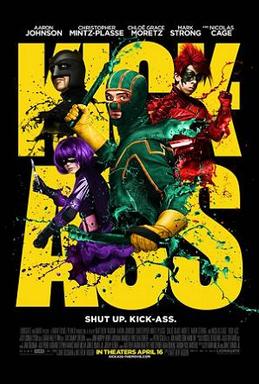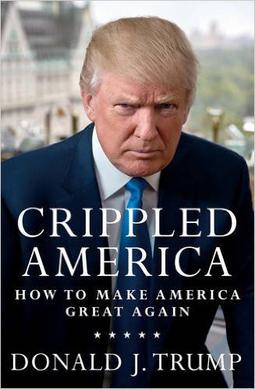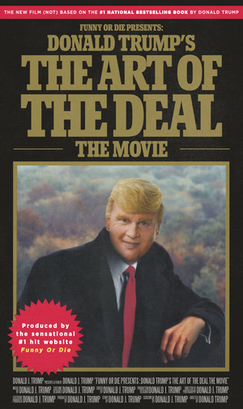
Arthur Betz Laffer is an American economist and author who first gained prominence during the Reagan administration as a member of Reagan's Economic Policy Advisory Board (1981–1989). Laffer is best known for the Laffer curve, an illustration of the theory that there exists some tax rate between 0% and 100% that will result in maximum tax revenue for government. In certain circumstances, this would allow governments to cut taxes, and simultaneously increase revenue and economic growth.
Think Big was a 1980s New Zealand state economic strategy.

David Hillel Gelernter is an American computer scientist, artist, and writer. He is a professor of computer science at Yale University.

Stephen Moore is an American conservative writer and television commentator on economic issues. He co-founded and served as president of the Club for Growth from 1999 to 2004. Moore is a former member of the Wall Street Journal editorial board. He worked at The Heritage Foundation from 1983 to 1987 and again since 2014. Moore advised Herman Cain's 2012 presidential campaign and Donald Trump's 2016 presidential campaign.
The Learning Annex was an American education company based in New York City. It was founded in 1980 by Bill Zanker in his New York City studio apartment with a $5,000 investment.

Tomas J. Philipson is a Swedish-born American economist who served as the Acting Chairman of the Council of Economic Advisers in the Trump administration. He departed from the position and the Council at the end of June, 2020, to return to the University of Chicago. He holds the Daniel Levin Chair in Public Policy at the University of Chicago, with posts in the Harris School of Public Policy Studies, Department of Economics, and the Law School. He was a Director of the Becker Friedman Institute at the university.
Bill Zanker is an American businessman who is best known for being the founder of the adult education company The Learning Annex.

Kick-Ass is a 2010 superhero black comedy film directed by Matthew Vaughn from a screenplay by Jane Goldman and Vaughn. It is based on the Marvel Comics's comic book of the same name by Mark Millar and John Romita Jr, and is the first film in the Kick-Ass franchise.

Trump: The Art of the Deal is a 1987 book credited to Donald J. Trump and journalist Tony Schwartz. Part memoir and part business-advice book, it was the first book credited to Trump, and it helped to make him a household name. It reached number 1 on The New York Times Best Seller list, stayed there for 13 weeks, and altogether held a position on the list for 48 weeks.

Kick-Ass 2 is a 2013 black comedy superhero film written and directed by Jeff Wadlow, based on the Marvel Comics graphic novels Book Two and Book Three of Kick-Ass – The Dave Lizewski Years by Mark Millar and John Romita, Jr., and serving as a sequel to 2010's Kick-Ass. It is the second film in the Kick-Ass franchise, and stars Aaron Taylor-Johnson, Christopher Mintz-Plasse, Chloë Grace Moretz, and Jim Carrey, with the former trio reprising their roles from the first film. The film follows Dave Lizewski / Kick-Ass (Taylor-Johnson), who joins a vigilante team called "Justice Forever", while Mindy Macready / Hit Girl (Moretz) attempts to live a normal life, and Chris D'Amico (Mintz-Plasse) taking up the mantle of The Motherfucker and forming a supervillain team to take revenge on Kick-Ass.

Crippled America: How to Make America Great Again is a non-fiction book by businessman Donald Trump, first published in hardcover by Simon & Schuster in 2015. A revised edition was subsequently republished eight months later in trade paperback format under the title Great Again: How to Fix Our Crippled America. Like his previous work Time to Get Tough (2011) did for the U.S. presidential election in 2012, Crippled America outlined Trump's political agenda as he ran in the 2016 election on a conservative platform.

Donald Trump's The Art of the Deal: The Movie is a 2016 American parody film by the production company Funny or Die. The satire of businessman Donald Trump was released during his 2016 campaign for President of the United States, nine months before he was elected President.
This bibliography of Donald Trump is a list of written and published works, by and about Donald Trump, the former President of the United States. Due to the sheer volume of books about Trump, the titles listed here are limited to non-fiction books about Trump or his presidency, published by notable authors and scholars. Tertiary sources, satire, and self-published books are excluded.

This article describes the foreign policy positions taken by Donald Trump during his 2016 presidential campaign.

TrumpNation: The Art of Being the Donald is a 2005 biographical book about Donald Trump that was written by Timothy L. O'Brien and published by Warner Books. After the book was published, Trump filed a $5 billion lawsuit against O'Brien, who had written that Trump was not a billionaire and that his net worth actually ranged between $150 million and $250 million. Trump sought $2.5 billion in compensatory damages and an additional $2.5 billion in punitive damages. The lawsuit was dismissed in 2009, and an appeals court affirmed the decision in 2011.

Why We Want You to Be Rich: Two Men, One Message is a non-fiction book about personal finance, co-authored by Donald Trump and Robert Kiyosaki. The book was first published in hardcover format in 2006. The coauthors became familiar with each other through mutual work at The Learning Annex and Trump being impressed by Kiyosaki's writing success with Rich Dad Poor Dad. Trump and Kiyosaki co-authored another book together in 2011, Midas Touch: Why Some Entrepreneurs Get Rich-And Why Most Don't. The book discusses American economic problems including the middle-class squeeze, economic globalization, and the national debt of the United States. The authors advise the reader to gain financial literacy and delve into entrepreneurship. Trump and Kiyosaki criticize mutual funds and advocate real estate investing as a way to build wealth.

Midas Touch: Why Some Entrepreneurs Get Rich — And Why Most Don't is a non-fiction book about personal finance, co-authored by Donald Trump and Robert Kiyosaki. The book was published in hardcover format in 2011. The coauthors became familiar with each other through mutual work at The Learning Annex, and The Art of the Deal. Trump was impressed by Kiyosaki's writing success with Rich Dad Poor Dad. The coauthors then wrote Why We Want You to be Rich together in 2006, and followed it up with Midas Touch in 2011.

Time to Get Tough: Making America #1 Again is a non-fiction book by Donald Trump. It was published in hardcover format by Regnery Publishing in 2011, and reissued under the title Time to Get Tough: Make America Great Again! in 2015 to match Trump's 2016 election campaign slogan. Trump had previously published The America We Deserve (2000) as preparation for his attempt to run in the 2000 U.S. presidential campaign with a populist platform. Time to Get Tough in contrast served as his prelude to the 2012 U.S. presidential campaign, with a conservative platform.

Trump Tower is a work of fiction by Jeffrey Robinson, originally credited to Donald Trump, and billed as Trump's "debut novel" by the publisher. It was first published in 2011 by Vanguard Press. Trump had previously attempted to create a television series titled Trump Tower, modeled after Dallas, Dynasty, and Upstairs, Downstairs. He worked with MVP Entertainment, contracted a writer in Los Angeles, and successfully had Showtime Networks develop a television pilot. After receiving a payment for television rights to Trump Tower, he marketed the idea to Lifetime. The book by this title was developed in 2011 listing Trump, but when released in 2012 credited Robinson as sole author.

Trump 101: The Way to Success is a book credited to Donald Trump and written by ghostwriter Meredith McIver. The first edition was published in hardcover format by Wiley in 2006. The book contains twenty-four chapters imparting advice on business acumen with quotations included from Trump. The authors caution the reader about the inherent risks seen in business deals, and advise individuals to promptly deal with conflicts. Trump recommends other books including The Art of War and The Power of Positive Thinking, as well as his company Trump University.




















